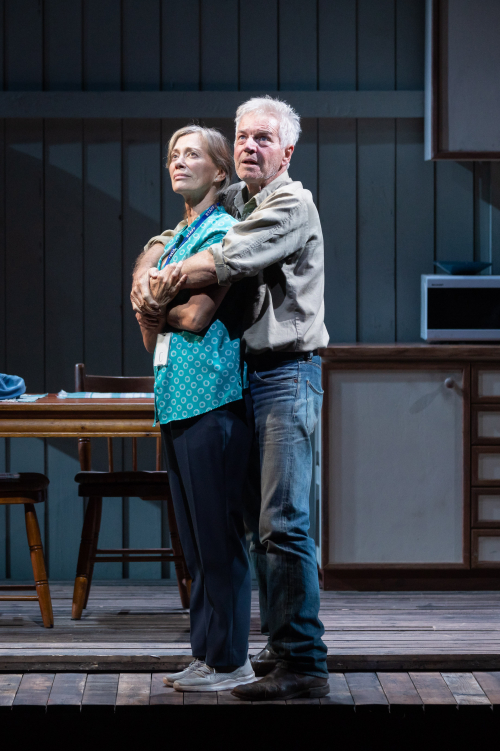Sydney Theatre Company, Wharf 1 Theatre, April 6
9.5/10
Set in the bush, where survival is the main entertainment, Angus Cerini’s play, here having its world premiere, will outlive us all. Yet one of the work’s many wonders is that it’s not about the harshness of life, it’s about the mystery of it.
In Paige Rattray’s production, David Fleischer’s set sits high: a farmhouse on stilts, small and isolated on an otherwise vast and empty stage. There live Ray (Colin Friels) and Floss (Kerry Armstrong), he a cattle farmer, she a medico. Drought has brought them to their knees, and then rain comes rattling on their roof: wet, glorious, survival-giving, wealth-making rain, that makes the taciturn Ray dance with joy.

Only it doesn’t stop. It rattles on that roof as though it’s going to wear it through, and soon enough it’s up to the cattle’s necks, and their hooves are stuck in the mud, and they must be shot. The whole herd. Seventy of them. Ray’s pride and work. Gone. Such is the Australian Dream.
Colin Friels embeds himself deep this study of stoicism that’s Ray; Ray who can only withstand so much. He moves like a creature formed by the land: hunched with the toil of taming it; wary, yet unafraid; his voice as dry as year-old gum leaves.
He struggles to tell his son (James O’Connell) he loves him, but he dotes on Floss. She is his sun and moon, and even when they argue, not a strand of their relationship frays. Kerry Armstrong, in, amazingly, her Sydney Theatre Company debut, harmonises with Friels note for note, her Floss papering the walls of Ray’s austere world with rose-coloured paper.
Then she dies. Now Ray has no herd and no wife: just land without life, one neighbour who’s a crook and one (Bruce Spence) who’s a font of amusing earthy wisdom, as he tries to pick Ray up from his loss, and dust him off. Spence and Friels are like two old rogues of the stage as they badmouth the crook who lives a few paddocks away, and who somehow thrives amid the desolation.

Cerini’s play is imaginative, moving and gloriously theatrical. He dares to give Ray soliloquies in which he allows the language to soar somewhere above Ray’s daily prattle, but we buy it, because essences are being squeezed from kernels, and because Friels is so bloody good. And when stoicism won’t cut the mustard any more, and Ray stares into a mirror with no reflection, Friels rises far above good: he makes it tough to keep watching.
Ray’s little poetic flights don’t burst from nowhere. Even when the language is rooted in the earth, there’s a heightened realism in the way the other characters wheel around him like assorted birds, and his soliloquies have the truth of inevitability. Besides, Cerini clusters his play with other heightened devices, including playing with time as a child might with a piece of elastic. It flashes back and then further back, and often comes in short vignettes: shot-glasses of time.
This is Cerini’s finest work, and Rattray’s, too. As for Friels, he dispels early doubts his performance might be slightly forced, and then gives anything he’s ever done a run for its money. The cast is completed by Renee Lim, and the play is extraordinarily well served by Nick Schlieper’s lighting and Clemence Williams’ music, the latter at once the land, time and the phantoms shimmering in Ray’s mind, often rendered via doleful bass clarinet, or ripples of elegiac piano. You won’t forget you saw this one.
Until May 19.